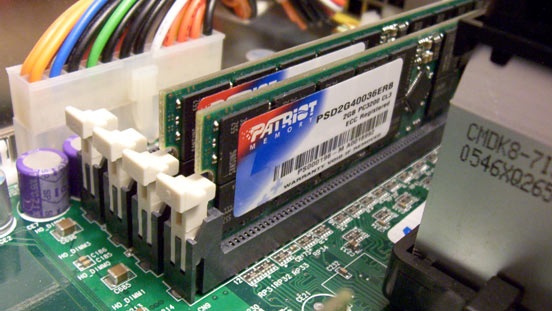Good tip when upgrading computer RAM

I. Questions you need to answer before upgrading:
1. How much is your computer currently available?
If the computer shows signs of slowing or stalling when you upgrade the software version for work (such as Photoshop with graphic people, for example), the first thing to do is to see if the device is equipped How much RAM The operation is quite simple, you just have to go to My Computer > Properties > look down on Memory or Installed Memory to see how much.
2. The mainboard of the computer has several RAM slots?
After watching the amount of RAM available on your computer, be careful to review how much RAM the mainboard has. To know this, simply go to the manufacturer's home page to see the mainboard specification or see the manual that comes with buying or opening the case to see.
The simpler way to help you see how many RAM slots without opening the machine and tearing the warranty stamp is to visit www.cpuid.com/softwares/cpu-z.html and download CPU-Z. Then run this utility and switch to the SPD card> press the drop-down button right away to Memory Slot Selection to see if there are slots and in fact the RAM is mounted in several slots and how many slots are left empty. The empty slots will have no information on the details (Module Size, Max Bandwidth, .).
After you have all the information about DIMM slots, available capacity and available slots, calculate and figure out how to upgrade appropriately to avoid costly but inefficient. For example, the motherboard has two slots attached to 512MB, if you want to upgrade to 2GB, you must remove two old bars and replace it with a 2GB or two 1GB sticks. If the computer has 4 slots (double channel) or 6 slots (triple channel) and there are two or three slots available, the upgrade will be easier without removing the two old ones.
If the computer you use RAM from Crucial will be equipped with an application called Crucial System Scanner (http://www.crucial.com/systemscanner) that allows you to proceed to download and scan the entire system. to provide the best solution to upgrade. You can use it to check the limit of the amount of RAM you can install on the board on your computer system.
Recommended upgrade of Crucial System Scanner RAM (currently 2GB on 2 slots and can be upgraded to 8GB at a price of about USD 260)
3. How much more RAM do you need and how should you choose?
Depending on the needs of use, you consider to upgrade to the appropriate RAM level. If you use 32-bit Windows with basic tasks like surfing the web, office or working with Photoshop versions of CS3 again, 2GB is enough. But if the demand is higher (playing games, 3D, .), you can upgrade to a higher level. But note that 32-bit Windows only accepts up to 3.2GB of RAM (or 4GB, depending on the CPU).
Next, consider what kind of RAM memory should be purchased for your computer. There are three types of RAM currently available on the market: DDR, DDR2 and DDR3 with different pin design. For each DIMM slot to plug in a RAM stick, you need to select only one type of memory to attach to. This means you cannot plug DDR memory into DDR2 or DDR3 slot and the like.
Although three channel memory products appear quite a lot, you should note that only Core i7 CPU series (LGA 1366 version based on X58 chipset) have three channel memory controller blocks. All lines using LGA 1156 and another X58 chipset and all models from AMD only support dual channel memory. Therefore buying third-channel memory is only effective when you have a suitable computer system. Left, the dual channel kit solutions will save you money and ensure the best efficiency for the system.
Some dual-channel kits also have high-speed operation profiles optimized for Intel CPU (XMP Profile) or AMD . if possible, you can buy these RAM streams to get more performance improvements. . Note that choosing RAM model with the same brand with old RAM will help the system run most stable.
Currently, RAM prices are quite stable and not very high. For example, DDR2 800 RAM with 2GB capacity ranges from 850,000 to 1.2 million (depending on the brand). To select the RAM bar for your system. It's best to go to the store and look carefully before buying.
II. Details of how to upgrade
If you are afraid of affecting the warranty (if any), you should bring it to the store for them to upgrade. In fact, how to manipulate RAM upgrade is quite simple. If you have a little patience and meticulousness, you can do it yourself.
Step 1. Remove the screws on the left edge of the device and remove the side cover.
Step 2. Find the area of the RAM on the mainboard and carefully push the two mounts at the ends of the RAM stick.
Step 3. Navigate the RAM stick to match the slot. Apply the RAM to the slot to test so that the cut matches the horizontal barrier on the slot.
Step 4. Insert the RAM into the slot and gently press down with both thumbs at the same time. When you hear a ' crack ' when the RAM is attached to the slot, the two white mounts close and hold onto the RAM is successful. Manually manipulate the remaining RAM bars.
Step 5. Finally, boot into Windows to see if it works. If a " beep " condition occurs when pressing Power, carefully remove and reinstall it. When the device enters Windows and runs stably, at the same time receiving the correct amount of RAM upgrade in CPU-Z, close the lid.
So the upgrade process is successful, you can enjoy the power on your computer already!